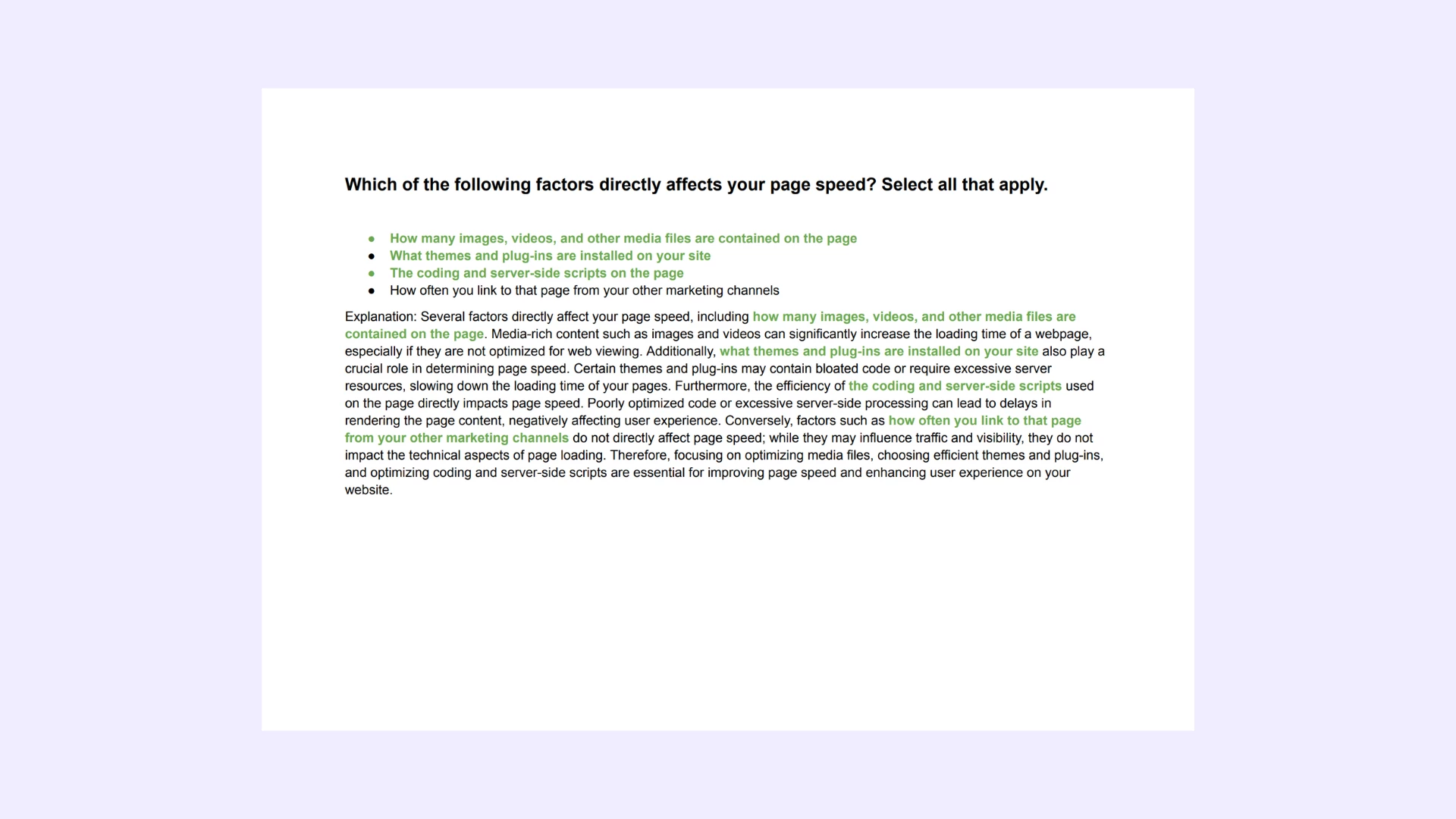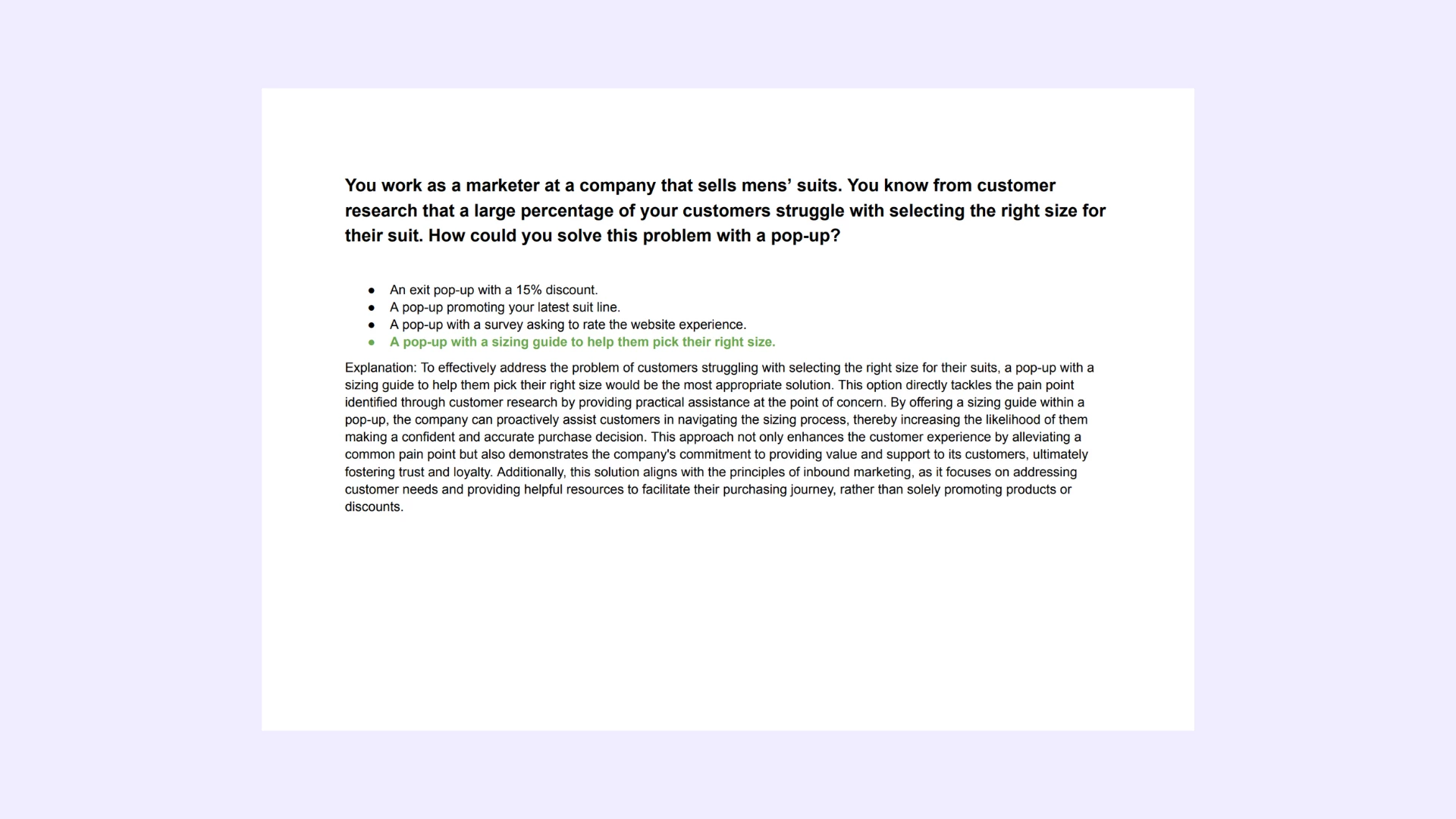In what order should the steps to conduct a marketing experiment be completed?
Make a hypothesis, collect research, choose measurement metrics, create and execute the experiment, analyze the results
Choose measurement metrics, collect research, make a hypothesis, create and execute the experiment, analyze the results
Analyze the results, make a hypothesis, choose measurement metrics, create and execute the experiment, collect research
Collect research, choose measurement metrics, make a hypothesis, analyze the results, create and execute the experiment

HubSpot Roll. Includes Answers for Every Real HubSpot Certification Exam.
All-in-One: Get all HubSpot exams answers with explanations in one bundle. This package includes answers for every current HubSpot certification. Regular updates to reflect the latest exam version. -> See what's included.


Need a single cerification exam answers? Check out our -> list of certification exams answer keys. Learn Smarter. Obtain or Renew your certificates with peace of mind!
Explanation: In what order should the steps to conduct a marketing experiment be completed?
Explanation: To conduct a marketing experiment effectively, it's crucial to follow a structured approach, and the correct order of steps begins with **making a hypothesis**. This initial step involves formulating a clear and testable statement about the expected outcome of the experiment based on existing knowledge and insights. Once the hypothesis is established, the next step is to **collect research** to gather relevant data and insights that will inform the experiment's design and parameters. Following this, marketers should **choose measurement metrics** that align with the experiment's goals and objectives, ensuring that the selected metrics will accurately gauge the impact of the experiment on the target variables. With the hypothesis, research, and metrics in place, the next step is to **create and execute the experiment** according to the predefined plan, ensuring consistency and accuracy in implementation. Finally, after the experiment has been conducted, marketers need to thoroughly **analyze the results** to assess the experiment's effectiveness, validate or refute the initial hypothesis, and derive actionable insights for future marketing strategies. This systematic approach, starting from hypothesis formulation and progressing through research, metric selection, experiment execution, and result analysis, ensures that marketers conduct experiments in a methodical and rigorous manner, maximizing the validity and reliability of the findings obtained.

Special Bundle Offer HubSpot Roll. All in One
Note: We conduct daily checks for updates on the exam, ensuring that the file contains the most recent questions from the actual certification program.
Questions | Answers | Explanations. FREE Updates.
You may also be interested:
- Special HubSpot bundle offer - all HubSpot exams in one
- HubSpot CMS for develpers certification exam answers
- HubSpot CMS for develpers II certification exam answers
- HubSpot content hub for marketers certification exam answers
- HubSpot content marketing certification exam answers
- HubSpot contextual marketing certification exam answers
- HubSpot digital advertising certification exam answers
- HubSpot digital marketing certification exam answers
- HubSpot email marketing certification exam answers
- HubSpot frictionless sales certification exam answers
- HubSpot growth driven design certification exam answers
- HubSpot inbound certification exam answers
- HubSpot inbound marketing certification exam answers
- HubSpot inbound marketing optimization certification exam answers
- HubSpot inbound sales certification exam answers
- HubSpot integrating with HubSpot I foundations certification exam answers
- HubSpot marketing hub software certification exam answers
- HubSpot reporting certification exam answers
- HubSpot revenue operations certification exam answers
- HubSpot sales enablement certification exam answers
- HubSpot sales hub software certification exam answers
- HubSpot sales management certification exam answers
- HubSpot sales software certification exam answers
- HubSpot seo certification exam answers
- HubSpot seo II certification exam answers
- HubSpot service hub software certification exam answers
- HubSpot social media marketing certification exam answers
- HubSpot social media marketing II certification exam answers